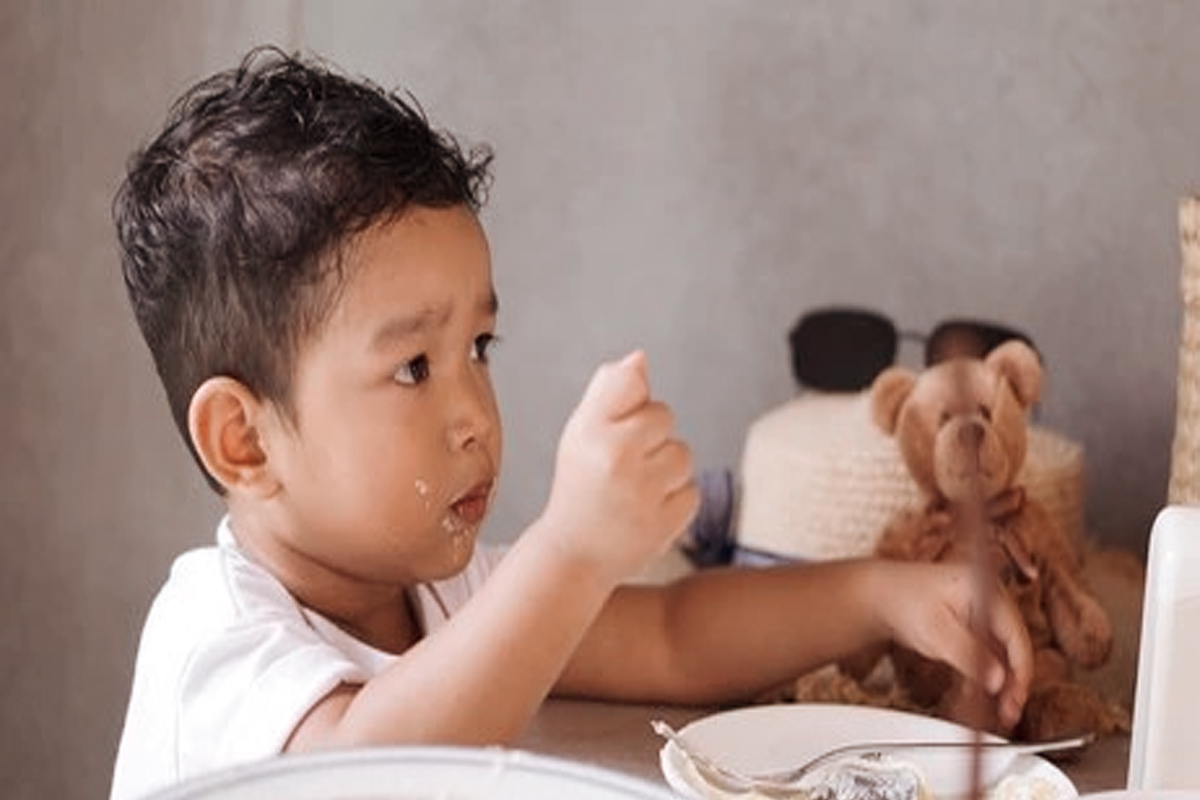As your toddler ventures into the realm of the 18th month, a myriad of captivating developments and milestones come to the forefront, highlighting the dynamic progression of their growth. During this stage, your little one is likely to showcase an array of emerging skills and behaviors that signify their evolving capabilities. From language acquisition to motor skills, let’s delve into the intriguing world of your 18-month-old toddler’s development.
Table of Contents
ToggleWhat are the Toddler’s Development and Milestones in the 18th Month
Movement/Physical Development Milestones
- Walks without holding on to anyone or anything
- Climbs on and off a chair or couch without help
- Drinks from a cup without a lid and may spill sometimes
- Uses their fingers and maybe a spoon to eat
- Scribbles
Communication and Language Skills
- Points to show others something interesting
- May start to say a few words, such as “more” or “please”
- Follows one-step directions said with words and not gestures (“Pick up the toy.”)
Cognitive Skills (Thinking and Learning)
- Copies of you doing chores, like sweeping
- Simply plays with toys, like pushing a toy car
Social and Emotional Development:
- He moves away from you but looks to make sure you are close by
- Puts hands out for you to wash them
- Look at a few pages in a book with you
What are the activities needed to Support your 18-month-old toddler’s development
Fine Motor Skills
- Provide activities that involve picking up small objects, such as building blocks or beads.
- Encourage scribbling with large crayons or markers on paper.
Gross Motor Skills
- Set up safe spaces for climbing, crawling, and exploring.
- Play games that involve kicking a ball or rolling it back and forth.
Language Development
- Engage in conversations with your toddler, expanding on their attempts at speech.
- Read books together, pointing to pictures and naming objects.
Sorting and Matching
- Introduce activities that involve sorting objects by color, shape, or size.
- Play matching games with cards or objects.
Outdoor Exploration
- Spend time outdoors exploring nature, such as going on nature walks or playing in a sandbox.
- Point out different plants, animals, and objects in the environment.
What are the Mealtimes and Menus for Your 18-Month-Old
Breakfast
- Offer a variety of cereals, bread, or toast with spreads like avocado, peanut butter, or low-fat cheese. You can also provide yogurt, milk-based drinks, or smoothies with fruits.
Lunch
- Include a mix of vegetables, starchy foods, and lean proteins. For example, you can serve a vegetable soup with pasta or rice, or a combination of vegetables and protein, such as tofu or chicken.
Dinner
- Offer a light dinner, such as a vegetable soup or a combination of vegetables and protein, like fish or lean meat. You can also provide dairy products like yogurt or cheese and a serving of fruit.
Snacks
- Provide nutritious snacks like fruits, vegetables, whole grains, or lean proteins. You can also offer dairy products, such as yogurt or cheese, or a combination of fruits and vegetables like apple slices or carrot sticks.
What is the Sleep Schedule of your 18-Month-Old Toddler
Nighttime Sleep
- Bedtime. Aim for a bedtime between 7:00 PM and 8:00 PM. Consistency is key, so choose a time that suits your toddler and family routine.
- Sleep Duration. Your toddler may need about 11 to 14 hours of sleep per 24-hour period, including nighttime and naps. Most toddlers at this age sleep around 11 to 12 hours at night.
Naps
- Number of Naps. At 18 months, your toddler might transition from two naps to one longer afternoon nap. However, some toddlers still benefit from a shorter morning nap. Pay attention to your toddler’s cues and adjust as needed.
- Afternoon Nap. If your toddler takes one nap, it typically occurs in the afternoon, from 12:30 PM to 2:00 PM. The nap may last anywhere from 1.5 to 3 hours, depending on your toddler’s needs.
Tips for a Smooth Sleep Schedule
- Consistency is Key. Try to keep both bedtime and nap times consistent every day, even on weekends.
- Create a Relaxing Environment. Ensure the sleep environment is conducive to rest. Dim the lights, maintain a comfortable temperature, and use soft bedding.
- Limit Stimulating Activities Before Bed. Minimize stimulating activities, such as screen time, in the hour leading up to bedtime.
- Encourage Self-Soothing. Encourage your toddler to self-soothe by providing comfort items like a favorite blanket or stuffed animal.
Day in the Life of an 18-Month-Old Toddler
Eating
- 3 meals and 2-3 nutritious snacks daily
- Toddlers should be offered food every 2 to 3 hours
- It’s important to follow the toddler’s hunger and fullness cues
Sleeping
- 11 to 14 hours of sleep per 24-hour period
- A single nap during the day, which is usually around 1 to 3 hours long
- It’s important to be responsive to your toddler’s sleep needs and to create a calming pre-nap routine to help them settle down for their nap
Developmental Activities
- Encourage creativity through activities like drama, music, dance, and art
- Introduce art activities, like finger painting or drawing with crayons
- Take a stroll in the park or play in the backyard. Outdoor activities promote physical development and provide a change of scenery.
Fun Facts
- At 18 months, they may experience a rapid increase in their vocabulary, learning new words quickly
- At this age may start to express their independence by saying “mine” and “now”
Toddler’s Health at 18-Month-Old
Developmental delays
- At the 18-month checkup, toddlers receive a screening test to identify any developmental delays or autism.
Appetite changes
- Growth slows down at this age, so it’s normal for toddlers to experience decreased appetite.
Infections
- Toddlers may be more susceptible to infections due to their developing immune systems, and parents should be aware of any infections that are making the rounds in their area.
Toilet training
- While most children do better with toilet training when they’re a little older, usually between 2-3 years, parents should let their doctor know if their child has diarrhea, is constipated, or has poop that’s hard to pass
Development Tips for Your Toddler This Month
Encourage Independence
- Foster your toddler’s independence by letting them do simple tasks on their own, like feeding themselves or putting away toys. This builds confidence and self-help skills.
Language Enrichment
- Engage in conversations and read books together daily. This helps enhance their language skills and promotes a love for learning.
Outdoor Exploration
- Spend time outdoors exploring nature. Whether it’s a visit to the park or a nature walk, outdoor activities contribute to physical development and a connection with the environment.
Social Playtime
- Arrange playdates or playgroups to encourage social interaction. This helps toddlers learn valuable social skills like sharing and taking turns.
Introduction to Numbers
- Introduce basic counting during everyday activities. Count fingers, toes, or objects around the house to lay the foundation for early math skills.
Healthy Eating Habits:
- Continue offering a variety of nutritious foods to support their overall health and development. Include fruits, vegetables, and whole grains in their meals and snacks.
Items Needed on the 18th Month of Your Toddler
Apparel
- Comfortable clothing for various weather conditions.
- Soft shoes or sneakers for support during play and exploration.
Feeding Essentials
- Sippy cups for transitioning to independent drinking.
- Toddler-friendly utensils and plates for self-feeding.
- Bibs to minimize mess during meals.
Diapering Supplies
- Diapers or pull-ups in the appropriate size.
- Baby wipes for quick and gentle clean-ups.
Sleeping Gear
- Cozy pajamas for a comfortable night’s sleep.
- Fitted crib sheets and a light blanket.
Health and Safety
- Childproofing items for a safe home environment.
- Basic baby first aid kit with essentials like band-aids and infant pain reliever.
Developmental Toys
- Age-appropriate toys that encourage learning and creativity.
- Soft toys for cuddling and comfort.
Outdoor Gear
- Sun hat and sunscreen for outdoor protection.
- Sturdy stroller for walks and outings.
Toiletries
- Gentle baby shampoo and body wash.
- Soft-bristled toothbrush and fluoride-free toothpaste.
Mealtime Extras
- High chair for comfortable and secure meals.
- Healthy snacks like cut-up fruits and veggies.
Learning Aids
- Simple puzzles or shape sorters for cognitive development.
- Large crayons and paper for creative expression.
Life as a Parent on Toddler’s 18th Month
Morning Adventures
- Your day often begins with a burst of energy as your toddler wakes up ready to explore. Morning routines involve dressing them in comfortable clothes and ensuring a nutritious breakfast to fuel their curiosity.
Playtime Extravaganza
- Engaging in play is a central theme of your day. From building towers with blocks to imaginative play with dolls or action figures, each moment contributes to their growth and development.
Mealtime Mayhem
- Shared meals can be a delightful yet messy affair. Introducing self-feeding with toddler-friendly utensils and navigating food preferences become a routine challenge.
Outdoor Escapades
- Weather permitting, outdoor activities such as walks in the park or backyard playtime become a staple. These moments not only provide fresh air but also contribute to physical development.
Communication Triumphs
- Your toddler is likely making strides in language development. Conversations, storytime, and identifying objects contribute to their growing communication skills.
Naptime Negotiations
- Establishing a consistent naptime routine can be a delicate balance. Ensuring they get adequate rest becomes crucial for their overall well-being.
Evening Wind-Down
- Evening routines involve a calming bath, bedtime stories, and creating a serene environment to ease your little one into a restful night’s sleep.
Parental Teamwork
- Parenthood at this stage often requires teamwork. Whether tag-teaming during challenging moments or sharing the joy of your toddler’s achievements, a united front makes the journey smoother.
Checklist needed for the 18th Month
Language and Communication
- Say at least 5 to 10 words.
- Follows simple one-step commands.
- Points to body parts when named.
- Imitates familiar words or phrases.
Social and Emotional Development
- Shows affection with hugs and kisses.
- Engages in pretend play, like feeding a doll.
- Expresses a range of emotions, including joy, frustration, and excitement.
- Demonstrates attachment to caregivers.
Feeding and Self-Care
- Feeds self with fingers and utensils.
- Drinks from a cup independently.
- Shows interest in washing hands or brushing teeth.
- Displays some independence during mealtimes.
Social Interaction
- Plays alongside other children.
- Shows early signs of sharing and taking turns.
- Responds to social cues and emotions of others.
- Displays curiosity about other children.
Routine and Independence
- Follows a basic daily routine.
- Displays some independence in self-care activities.
- Shows preferences and makes simple choices.
- Demonstrates understanding of basic instructions.
Last Updated on February 27, 2024
Written By
With a solid foundation in family dynamics, child development, and a knack for assessing products, our content is built on a strong grasp of our topics. We use trustworthy sources, seek advice from experts, and stay current with the latest happenings in our fields. We always give credit to our sources, reveal any possible conflicts of interest, and deliver info in a truthful and unbiased way. Follow us on Facebook or join our Facebook Group.
Start your journey to confident parenting
Join over 2,000+ parents who receive free practical advice and tips from Joyful PH. Unsubscribe anytime.
You may also like
Toddler’s Development and Milestones at 24th Month
A two-year-old's growth and achievements at 24 months are remarkable. Toddlers…
Toddler’s Development and Milestones at 23rd Month
In the 23rd month, toddlers exhibit significant developmental strides. Their…
Toddler’s Development and Milestones at 22nd Month
At 22 months, toddlers make strides in independence, speech, and motor skills.…
Toddler’s Development and Milestones at 21st Month
During the 21st month, toddlers continue their dynamic development. Language…
Toddler’s Development and Milestones at 20th Month
At 20 months, toddlers exhibit remarkable progress. Their language skills…
Toddler’s Development and Milestones at 19th Month
A toddler at 19 months undergoes significant development. Language skills…







